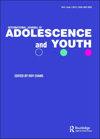青少年孤独感的探索性定性研究
IF 2.2
Q3 PSYCHOLOGY, DEVELOPMENTAL
International Journal of Adolescence and Youth
Pub Date : 2022-08-10
DOI:10.1080/02673843.2022.2109422
引用次数: 6
摘要
在世界范围内,青少年和年轻人的心理健康问题随着孤独感的增加而增加,这被认为是一个全球性的公共卫生问题。本研究的目的是通过青少年和年轻人的自我描述和经历来探讨孤独感。研究的问题是:(1)青少年和年轻人如何描述和体验孤独?(2)青少年和青壮年描述了哪些类型的孤独?数据是通过采访15名17-30岁讲瑞典语的芬兰人收集的。数据分析采用内容分析法。孤独与早期的负面经历、精神疾病或身体障碍、以自我为中心的社会、社会规范和社交媒体有关。研究确定了三种不同类型的孤独:社交孤独、情感孤独和存在孤独。重要的是,成年人和专业人士能够识别、解释和理解青少年和年轻人正在经历负面情绪的迹象,这可能表明潜在的孤独感。本文章由计算机程序翻译,如有差异,请以英文原文为准。
Loneliness as experienced by adolescents and young adults: an explorative qualitative study
ABSTRACT Mental health problems among adolescents and young adults are increasing worldwide together with loneliness, which is considered a global public health problem. The aim of this study was to explore loneliness through adolescents’ and young adults’ own descriptions and experiences. The research questions were: (1) How do adolescents and young adults describe and experience loneliness?, (2) What types of loneliness do adolescents and young adults describe? Data were collected through interviews with fifteen Swedish-speaking Finns aged 17–30. Content analysis was used for data analysis. Loneliness was linked to earlier negative experiences, mental illness or physical disorders, self-centred society, social norms and social media. Three different types of loneliness were identified: social loneliness, emotional loneliness and existential loneliness. It is important that adults and professionals are able to identify, interpret and understand signs that adolescents and young adults are experiencing negative feelings, which may indicate underlying loneliness.
求助全文
通过发布文献求助,成功后即可免费获取论文全文。
去求助
来源期刊

International Journal of Adolescence and Youth
PSYCHOLOGY, DEVELOPMENTAL-
CiteScore
8.80
自引率
2.20%
发文量
32
审稿时长
9 weeks
期刊介绍:
nternational Journal of Adolescence and Youth aims to identify, examine and compare particular issues, problems and policies related to adolescents and youth throughout the world. Subject areas covered include psychological growth and development, health and medical care, delinquency, social policy, employment and unemployment, education and training, spiritual and physical development, leisure, family relationships, sex education, homelessness. The Journal will be of interest to researchers in those areas, university and other higher education institutions, as well as to international, central and local government and voluntary organizations and field work agencies.
 求助内容:
求助内容: 应助结果提醒方式:
应助结果提醒方式:


